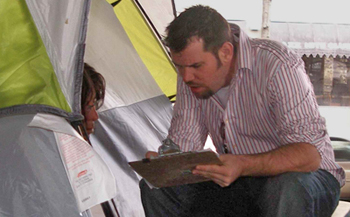
This week, the 100,000 Homes Campaign announced it had reached its goal of helping U.S. communities find permanent housing for 100,000 homeless Americans in just four years. That number includes more than 30,000 veterans, many of whom had previously been homeless for decades. Veteran homelessness has been dropping precipitously in recent years, and the fight to eliminate it now faces a pivotal moment.
For the last several years, national efforts to end veteran homelessness have proceeded with unusual focus. During that time, the nation’s Department of Housing and Urban Development has been ably led by Secretary Shaun Donovan, an astute policy thinker with vast housing experience. At the Department of Veterans Affairs, General Eric Shinseki has provided similar leadership, repeatedly committing the country to finding homes for every homeless veteran by December of 2015. These two men have spearheaded an effort that has resulted in a 24 percent drop in veteran homelessness since 2010. Today, there are fewer than 60,000 homeless veterans for the first time since the government began counting.
Last month, Secretary Shinseki resigned and President Obama announced that he would move Secretary Donovan to the Office of Management and Budget. Advocates for homeless veterans have been anxious ever since.
But leadership changes at HUD and VA need not slow national progress on ending veteran homelessness, because both Donovan and Shinseki have spent years laying a firm, data-driven foundation to help their successors continue the fight.
To end veteran homelessness, the incoming secretaries should continue the proven policy of Housing First, push Congress to expand the cost-saving HUD-VASH voucher program, and continue to drive increased collaboration at the community level.
For years, VA and other homeless service providers worked to offer medical and mental health care, addiction counseling, job training and countless other services to people living on the streets. Most homeless veterans were told they had to earn their way to permanent housing by checking these supplementary boxes.
While the intentions behind this approach were good, the unfortunate result was that chronically homeless veterans rarely escaped the streets. For most, it was simply too difficult to battle addiction, take care of serious physical and mental health conditions or find steady employment while simultaneously battling homelessness.
Since 2012, both HUD and VA have adopted a Housing First policy toward chronically homeless veterans. This policy is simple: help veterans secure safe, permanent housing right away, without imposing strict employment or treatment requirements, and then continue to work with them on their social and mental health goals afterwards. This evidence-based strategy has been proven effective over and over in published research, but it remains controversial to many Americans, who still believe that homeless veterans should have to prove themselves before being offered subsidized housing.
We disagree. When our veterans return home, our duty is to assist them, not make them prove that they are worthy of assistance.
The successful push to implement Housing First has relied heavily on the HUD-VASH voucher program, a joint initiative in which HUD provides chronically homeless veterans with a rental subsidy while the VA funds basic case management. This program has been transformative, helping tens of thousands of veterans spend more time in their own homes and less time in expensive, publicly funded hospitals. In fact, a recent VA report found that HUD-VASH, combined with a Housing First approach, resulted in 84 percent of participating veterans remaining stably housed after 12 months while reducing VA healthcare costs by 32 percent.
It is not often that a policy achieves such impressive outcomes for our veterans at such a dramatically reduced cost. The President has moved to expand the HUD-VASH program, and Congress should move to follow his lead.

